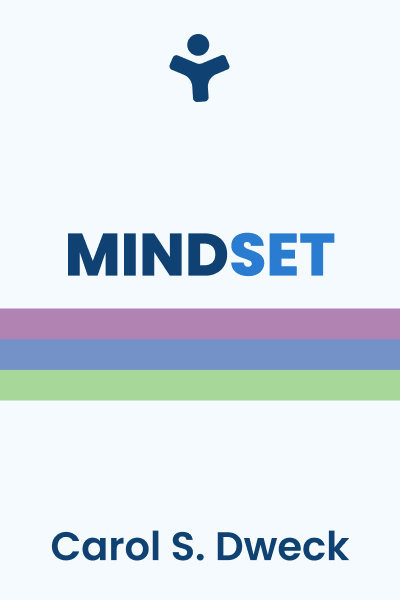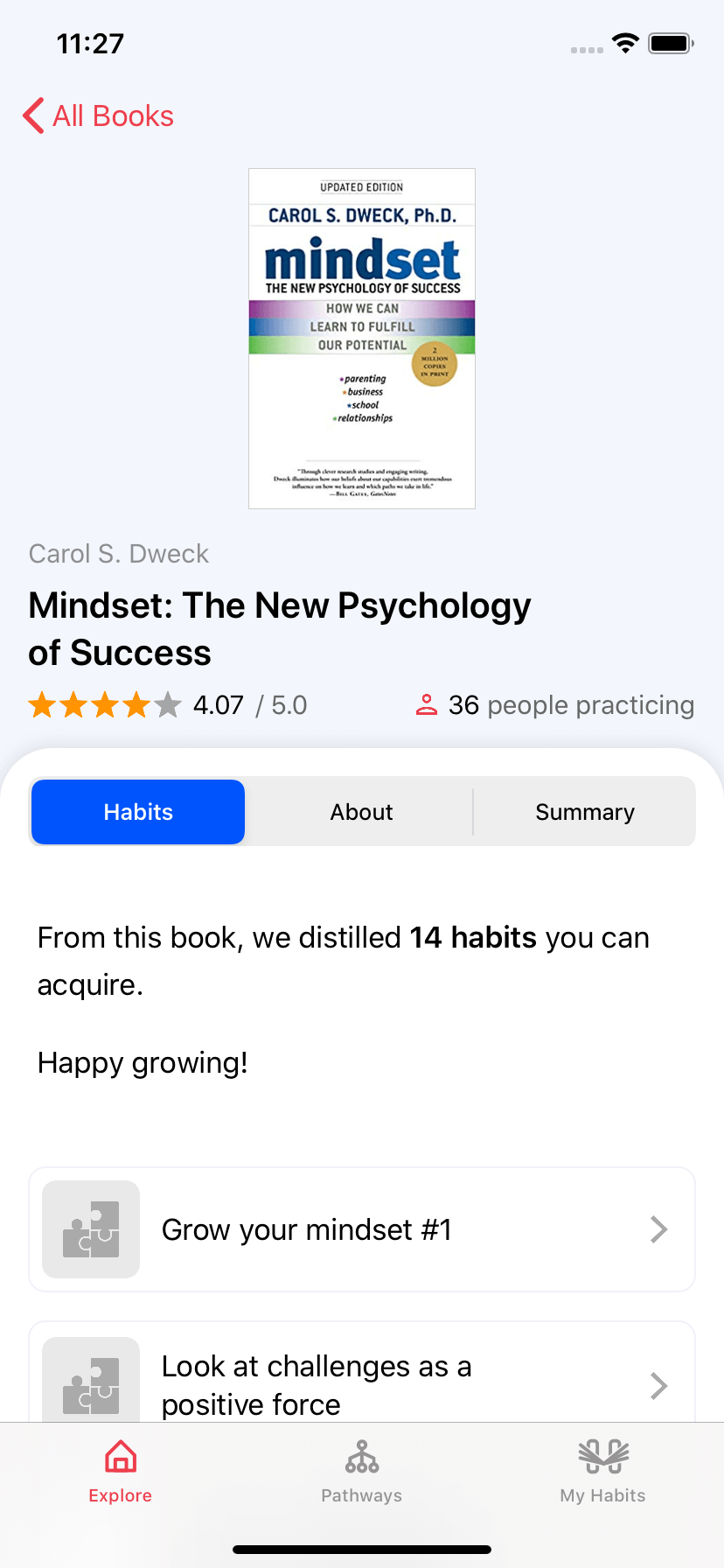
Mindset: The New Psychology of Success
by Carol S. DweckThis brilliant book shows how success in school, work, sports, the arts, and almost every area of human endeavor can be dramatically influenced by how we think about our talents and abilities. Mindset reveals step by step how parents, teachers, managers, and athletes can change their way of thinking and acting to achieve their goals.
The Mindsets
”(...)the view you adopt for yourself profoundly affects the way you lead your life.”
Many people think that intelligence, skills, and talents are innate and that they stay on one level throughout their lives. If we fail, it means that we are not suited for something or we are not smart enough. Meanwhile, everything depends on our attitude and mindset.
What is interesting, most children do not worry about their failures. They see the learning process in them. While many adults avoid new challenges in fear of failure, if you have not failed, it means that you have not tried.
Most often this is due to the system in which we live. You have “A”s at school - you are smart, you have “C”s - you are a loser. However, intelligence, talents, and personality are things that develop: they are not fixed or carved in stone. Our potential is unexplored and unpredictable.
There are two meanings of ability: the fixed ability (that must be proven) and the changeable ability that you develop during learning. There are two worlds - the fixed one where you have to validate yourself, show that you are smart, where effort is a bad thing because gifted people do not fail. In the other world, effort makes you talented and smart, you develop yourself by failures and learning.
We have a choice in which world we want to live. We just have to change our mindset.
Actions to take
Fixed vs Growth Mindsets
The examples of the CEOs of the top companies of the world show, that without an open mindset, the company doesn’t develop. This happened to Chrysler Motors. They kept producing the same car models over and over with only superficial changes. Meanwhile, the Japanese were not afraid of big changes or challenges and their cars were redesigned completely. They quickly took the market.
The differences between the mindsets can be seen in how people respond to correction and praise. Those who expect only praise mostly do not want to learn new things, they want to only show the things that they do perfectly. Those who want to hear every feedback, positive or negative, are those who get their thrill from what’s hard.
People with a fixed mindset expect an ability to appear on its own, before any effort. They believe that you are gifted or not, and you can’t do anything to change that.
This mindset changes the meaning of effort. Those with a growth mindset appreciate talent and predispositions but admire more the effort, which for a fixed mindset is only for those with deficiencies.
When we ask people with a fixed mindset about when they feel smart, they usually respond that it’s when they are better than others. For them, it is not about attitude but rather about proving and validating themselves. Special or talented means "better than others". They tend to value themselves at the expense of others, they blame others for their failures and they use excuses to justify those failures.
Fixed mindset people tend to transform their response from “I failed” to “I am a failure”. For those with a growth mindset, failure is not a pleasurable experience, but it doesn’t define them and it's treated as a lesson.
Actions to take
Inside the Mindsets: Questions and answers
1. Why do people want to, again and again, prove that they are intelligent or talented if they believe that these qualities are fixed, and have already proved them once?
Because new, more difficult situations appear, and what they showed yesterday is not enough today.
2. Is the mindset permanent or can it be changed?
Mindset is an important part of personality, but you can change it. Because you know that there are two types of mindsets, you can try to think and react in a new way.
3. Is it possible to be 50/50 of two mindsets?
All people have parts of both mindsets. Also, it depends on the area of one’s life. Some areas have a more fixed mindset and others a more growth mindset.
4. If people fail, is it because they didn’t put enough effort?
No! The effort is crucial, but of course, people have different talents, resources, and opportunities.
5. It is being said that the growth mindset makes you better than others, but isn’t it more about developing yourself?
By developing talent, you fulfill your potential. An attitude for growth allows people to love what they do, even in difficult situations. In the fixed mindset the result is the most important thing. The growth mindset people appreciate what they’re doing regardless of the outcome.
6. Many workaholics have a fixed mindset. They try to prove that they are the best but they take challenges and work hard. How does that fit in the theory that people with a fixed mindset go in for low effort and easy tasks?
In general, people with a fixed mindset prefer success without effort because it is the best way to prove their talent. But there are also a lot of people who work hard and think that their qualities are fixed; they look for continuous validation. Such people may not believe that high effort means low ability, but they have other parts of a fixed mindset.
7. What if someone likes his fixed mindset? If he knows his abilities and talents, and what to expect, why should he give that up?
If they like it, they can keep it. But still, it is good to know the alternatives.
8. Can every aspect of people’s lives be changed, and should people try to change everything they can?
The growth mindset is the belief that abilities can be developed. But it doesn’t give an answer to how much change is possible or how much time those changes would it take. Also, some values and preferences cannot be changed. The important thing is not everything that can be changed, should be changed.
9. Are people with the fixed mindset simply lacking in confidence?
No, but their confidence is weaker, and a bad feedback or failure can undermine it.
Actions to take
The Truth About Ability and Accomplishment
“The fixed mindset limits achievement.”
When we think about scientists, we imagine one person spending time on the research, in the laboratory and suddenly discovering an invention. But the truth is that many scientists, including Edison or Darwin, worked on big teams, spending half a lifetime before their ideas reached fruition. Teamwork is the key.
Again, motivation is crucial. What feeds talent is hard work, challenges, and endless curiosity. Benjamin Bloom, who studies over 120 outstanding achievers (artists, sportsmen, scientific, doctors), discovered that most of them were average as children or even early teenagers. Only their constant motivation, curiosity, and very hard work led them to the top.
It is good to know about the danger of praise and positive labels. It is much better to praise others for their effort like “Wow, you got 8/10. That’s a really good score. You must have worked really hard.” instead of “Wow, you got 8/10. That’s a really good score. You must be smart at this.” That small difference can put people into the growth or fixed mindset. When we praise for talents, people are scared to lose that affirmation and they avoid challenges. If we appreciate the effort, people will want to take on new tasks and learn new things.
Negative labels also can be a danger for fixed mindsets. Stereotypes can cause a lot of damage, as people feel that they do not deserve something, such as many minorities who gave up at college, or many women who gave up math and science classes because they were told they were not smart enough.
Actions to take
Sports: The Mindset of a Champion
“If you work hard at something, you get out what you put in.”
Most people believe that the best sportsmen are born gifted and they became champions mostly because of talent. We notice their physical predispositions like size, height, agility. But behind the success stands huge effort. The best examples are sportsmen like Muggsy Bogues, 5’3’’ NBA basketball player, Pete Gray, the one-armed baseball player in the major leagues or Muhammad Ali who failed all measurements of a promising boxer (fist, reach, chest expansion, weight). All these people had character. They didn’t consider themselves as special ones. Only because of constant hard work, learning to keep concentration under the pressure, and stretching themselves beyond their ordinary abilities, did they make it to the top. You can apply this also to the world outside of sports.
The second important thing is staying on top. Sometimes it is easier to get there than to stay there for a long time. Sometimes the only talent can get you there, but you need a real character to keep working as hard, or even harder, once you’re there.
Actions to take
Business: Mindset and Leadership
“Genius is not enough; we need to get the job done”
We can find a lot of examples of fixed and growth mindset CEOs of the biggest companies and how it reflected on leading their businesses. Nowadays, the impact of a generation raised on praise and the boosting of self-esteem on the leading of companies is big.
Enron is an example of how easy it can be to put people in the fixed mindset. Enron recruited only big talents, people who graduated from the best universities. Then paid big salaries. This is not bad in itself, but it created an environment where the most important thing was to look and act extraordinarily talented.
In the fixed, mindset world some people are superior over others. Fixed, mindset leaders very often use the company to raise their self-esteem. Sometimes it happens that they prefer to set the company up to fail, rather than see that other people can lead it better. They are bosses not leaders.
Bosses, by controlling and being abusive, can put the entire company into a fixed mindset. Everyone starts feeling that they are judged. In such places, people are afraid of taking the risk, of changes, of losing their position.
In contrast, growth, mindset CEOs are holding debates with employees, asking questions, rather than impressing the board of directors. They are not concerned about measuring or protecting their image, they appreciate feedback and learn from their mistakes. Very often they didn’t plan to be the leader, but by doing what they loved with enthusiasm and passion they went to the top. Talking about those achievements, they prefer using “we” instead of “I”. They believe in self-development and training.
The best managers are made, not born.
Actions to take
Relationships: Mindsets in Love (or Not)
“It doesn’t mean there is no “they lived happily ever after,” but it’s more like “they worked happily ever after”.”
Very often, before we find our second half, we are rejected and wounded. But it depends on our mindset, whether we plunge into despair, or learn from and enter into the next relationship with that new experience, knowledge, and changes that we have made through our breaking up. Every relationship teaches us what is important to us. It is extremely important to forgive, not to live in the past, and to find new happiness.
People with a fixed mindset most often think that ideal love does not require effort. If it is difficult, it means it is not that person. This kind of thinking is the most destructive belief in a relationship.
We can not expect that our partner will read our mind. The relationship needs clear communication.
Love without effort is a doomed relationship, not a great relationship. People with a fixed way of thinking, when they see defects in their partner, move it into the whole relationship, which is also flawed. People with the growth mindset still think that the relationship is fine.
In the fixed mindset, they have to confront the idea that, if there are problems, it means that someone is guilty. The blame is put on ourselves, our partners’, or on the relationship. The growth mindset allows us to accept flaws as a part of the person and the relationship, work on them, communicate, and to move on
Rejection and judging happen not only in love but also in schools in the form of bullying. Bullies are examples of people with fixed mindsets. They want to be seen as cool, powerful, or funny by demeaning others. We can protect ourselves by knowing that the problem is in themselves - their self-confidence is very weak. We have to focus on our good attitudes and forgive them, as they have the problem with themselves.
Actions to take
Parents, Teachers, and Coaches: Where Do Mindsets Come From?
“Praise should deal, not with the child’s personality attributes, but with his efforts and achievements.” Haim Ginott
Parents, teachers, and coaches have a huge impact on creating children’s mindsets. Every word and action send a message, that is why it is important to talk to children and behave in a growth mindset way. Very often our motivating techniques, lessons we give, words we use to put our children into the fixed mindset.
Is important to avoid praising attitudes like: “You learned that so quickly! You’re so intelligent!” , “This drawing is brilliant. You are the next Picasso”, “You’re so smart, you have “A’s without studying!”, “You didn’t make any mistakes”. We have to remember that speed and perfection are the enemies of difficult learning and completing challenges. Praising the attitudes give kids a boost they need, but it works only for a moment.
As children love to be praised of course we can do it, but in the growth mindset way - by emphasizing the effort they put into the process. We can discuss their strategies and appreciate their choices. Also, it is not recommended to protect children from failure.
It happens that people are very careful with praising their children in a growth-oriented way, but they judge other children: “She is so smart.”, “He is so stupid”, “Look, he has only “A’s”. In that way, we send a fixed mindset message to children.
Many of us in childhood were punished, judged, and given lessons that we would never forget. It was called discipline. But very often, it caused the fixed mindset. The alternative is showing interest, helping one to understand and learn. And of course, this doesn’t mean that we should lower our standards.
Our enemy is not failure but success. Failure forces us to develop, work harder, take a challenge, change a tactic.
Success can put us into a fixed mindset because we think that we proved something, that from now on we do not have to work so hard, and we will keep winning. It is more difficult to stay AT the top than reach it.
Actions to take
Changing Mindset
“New research shows that the brain is more like a muscle—it changes and gets stronger when you use it.”
The change of mindset is not like a surgery, those old beliefs would be cut away and new ones would replace them. In reality, new beliefs take their place alongside the old ones and become stronger and stronger. It is a long journey to feel, think and act in the growth mindset way.
Our minds constantly are monitoring and interpreting. Unfortunately, sometimes some people interpret situations in a very extreme way and react with an exaggerated sense of anxiety, depression, or anger. We can change the interpretation process. Instead of an internal monologue focused on judging like: “This means I’m a loser / bad partner / better than others” etc., we can take a constructive action: What and how can I improve? What can I learn from this? How can I solve the situation?
The fixed mindset is afraid of changes and criticism. That is what often says us: “Don’t do it!”, “It’s not worth to risk”, “Don’t change it”. The growth mindset would say: “Go for it!”, “Make it happen”, “Develop yourself”.
Many people plan to change something, but they procrastinate on it. The best way to make something happen is a concrete and detailed plan: When, where, and how will you do it? Then stick to the plan. The second thing is willpower. For many, it is something that you have or don’t have, but the truth is that you can develop your willpower.
We should make a plan and be aware that setbacks may happen. In such a situation it is good to ask yourself the questions what we can learn from it and what to do next time it happens. “It’s a learning process—not a battle between the bad you and the good you”.
The crucial thing in changing the mindset is maintaining the change. After reaching the aim we cannot stop doing what caused us to achieve it. Also, if we use only the growth mindset strategies, but stay in the fixed mindset, it can backfire. The framework has to be changed from judge-and-be-judged to learn-and-help-learn.
Actions to take
Don’t just read. Act.


